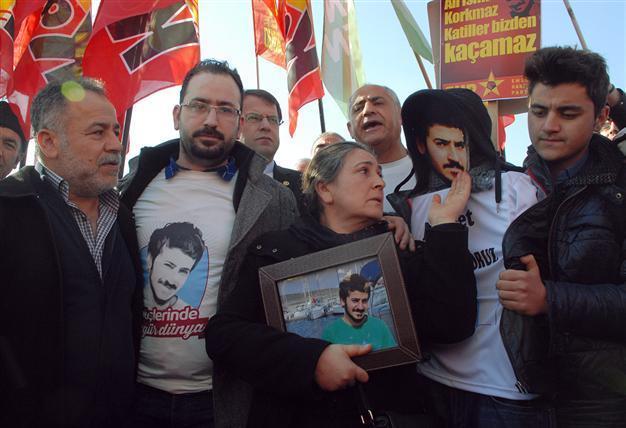Court postpones judgment in trial into Gezi protester’s murder amid controversy
KAYSERİ

Ali İsmail Korkmaz's mother, Emel (C), older brother and lawyer Gürkan (2L) and father, Şahap (L) , make a statement after the hearing of the trial in Kayseri, Dec. 26. DHA Photo
A Turkish court has postponed a verdict until Jan. 21, 2015, in a closely followed trial into the murder of Gezi protester Ali İsmail Korkmaz, whose death at the hands of plainclothes officers during the early days of last year’s nationwide demonstrations triggered national outrage, sending more people into the streets.
Mevlüt Saldoğan, the officer singled out by prosecutors as the main suspect, failed to attend the final hearing on Dec. 26, citing medical grounds. The court said it will not be able to issue a verdict before taking the final defense from Saldoğan, who is facing charges of first-degree murder in Korkmaz’s killing.
The court’s announcement prompted anger on the part of the victim’s brother and family’s lawyer, Gürkan Korkmaz, who said via Twitter, “We are concerned … There could be attempts to sabotage the judiciary and perhaps change the [judicial] panel.” Saldoğan’s lawyer, Mutlu Karayılan, was also absent from the hearing because he had to attend another trial.
“Considering that the illness of the murderer officer is not something requiring an urgent intervention and that his lawyer did not come to attend another hearing in the same city, … we see this as an attempt to exert pressure on the court and manipulate the judiciary,” Gürkan Korkmaz said.
A second officer, Yalçın Akbulut, is facing between 12 and 26 years in prison for “deliberately injuring” the 19-year-old student, while the prosecutors demanded the acquittal of the other two officers involved in the beating for “lack of evidence.”
Four civil suspects, all working a bakery in front of which Korkmaz was attacked, are facing between eight and 12 years of prison.
The victim’s mother, Emel Korkmaz, also expressed indignation that the verdict was delayed until next year. “Our kids lay underground while their murderers are sleeping in a warm place,” she said in reference to the other Gezi victims.
“In my opinion, they are dragging the case. Why was [the suspect policeman] not ill until now and had to be ill today? I don’t know about it, but it certainly doesn’t look convincing,” she said.
The trial process has been widely controversial since the hearings were moved to the conservative Central Anatolian province of Kayseri, instead of being held in the western city of Eskişehir where Korkmaz was studying and beaten to death.
Korkmaz’s family also slammed prosecutors for charging only one of the suspects with first-degree murder on the grounds that he was the one “who delivered the last three kicks.”
Gürkan Korkmaz accused prosecutors of protecting the two officers by asking for their acquittal, arguing that there were the senior ones who ordered Korkmaz’s capture.
But all officers and civil suspects present at denied their role in Korkmaz’s fatal beating, leading many observers to denounce what they described as an attempt of designating Saldoğan as a “scapegoat.” They also expressed once again their claims that the person on the footage was not Korkmaz.
Yalçın Akbulut’s lawyer even rejected the forensic report on the grounds that it did not consider the possibility that Korkmaz “fell from the stairs” or “was contaminated at hospital” in the autopsy, inviting opprobrium from the victim’s family.
“All the suspects have a common defense line: 1- The person beaten is not Ali İsmail [Korkmaz] 2- He was injured after falling while carrying objects 3 – The witnesses are lying 4 – Our suspect did not hit him,” Gürkan Korkmaz tweeted during the hearing.
A new prosecutor was also assigned to the case during the final hearing in another rather unexpected change.
For his part, Saldoğan rejected his responsibility for Korkmaz’s death, claiming that he only obeyed orders.
“The Eskişehir police chief, the governor, the interior minister and the prime minister should be included in the trial and their testimony should be collected. My client only fulfilled the instructions he was given,” his lawyer said.
Korkmaz died on July 10 after spending 38 days in a coma due to the injuries he sustained during the beating. Footage showing the beating emerged as demonstrations were ongoing, becoming one of the symbols of police violence against peaceful protesters.
Five protesters – Korkmaz, Mehmet Ayvalıtaş, Abdullah Cömert, Ethem Sarısülük and Ahmet Atakan – died as a direct result of crackdowns on the Gezi protests last summer, during the events themselves. Berkin Elvan, 15, died earlier this year after spending nine months in a coma due to the impact of a tear gas canister during a police crackdown on protests in Istanbul. Two more youth, Medeni Yıldırım and Hasan Ferit Gedik, are also counted among the Gezi victims after being shot dead in Lice and Istanbul, respectively, on the periphery of the Gezi events.
